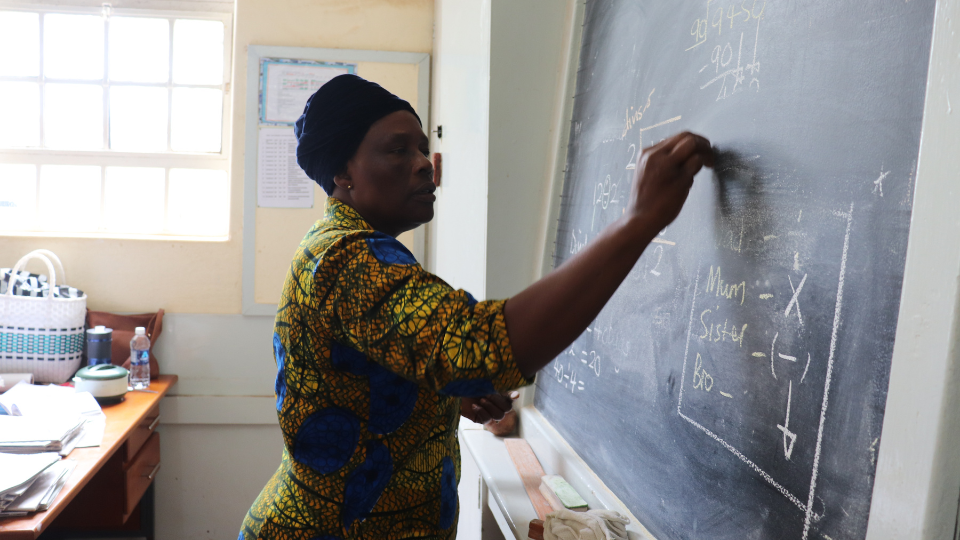The work of teachers is crucial in any education system, but the work of teachers in refugee settings is particularly critical. In this article, the second in a series on durable solutions to the challenges faced by teachers in refugee settings, we highlight the importance of job conditions, supervision and appraisal, and career progression for these teachers and make several recommendations, based on insights from four countries from our research with IIEP-UNESCO.
Recommendation 1: Ensure that teachers from refugee-hosting settings receive adequate benefits and hardship allowances.
Refugee-hosting regions tend to be remote and marginalised, with limited access to services. To ensure that teachers, particularly women, are supported to work in these often-harsh conditions, benefits and hardship allowances should be offered to support them. The provision of accommodation can also help attract and retain both national and refugee teachers.
‘If benefits were improved, it would attract more female teachers.’ – Stakeholder working in Kakuma and Dadaab Refugee camps, Kenya
Recommendation 2: Consistently implement teacher appraisal processes
All teachers of refugees –national and refugee, qualified and unqualified – should be regularly appraised. In countries that have a separate system for refugee teacher appraisal, this parallel system should be aligned with national procedures. This will allow national teachers to transition back into the national system more easily and will ensure that the same standards are applied to all teachers, whether or not they are qualified.
Our research showed that this is currently the practice in Ethiopia, where a school leader in a refugee school in Tigray explained: “We have a monthly appraisal system. All teachers are evaluated by department heads and Vice Director of school. Checklists are used to identify strong and weak teachers and grades are given. A teacher who gets an A gets an award, we do this every term.” Across the country, teacher performance monitoring is carried out on either once a month or at the end of each semester. If possible, the teachers also receive annual appraisal results. In some cases, also the Regional Education Bureau (REB) or woreda (diofficials take part in the appraisal process.i
“ […] when the teacher scores are compared to student results, it does not match up because student results are poor… scores are based upon relationships rather than teaching quality.” – Woreda Education Office (WEO) Representative in Benishangul-Gumuz, Ethiopia
Recommendation 3: Maximise opportunities for career progression by aligning professional development and appraisal with promotion opportunities
Teachers in refugee settings, particularly refugee teachers in camp schools, are often faced with limited opportunities for career progression. This may be because policies require that headteachers are national, or due to the remote location of refugee regions, which leads to reduced access to career-enhancing professional development opportunities. Efforts should therefore be made to develop an inclusive career progression framework which recognises and supports the participation of both national and refugee teachers from refugee-hosting regions in training and appraisal, and which is linked to clear promotion pathways.
Recommendation 4: Promote the active participation of teachers from refugee-hosting regions in teacher associations and include the voice of refugee teachers in educational decision-making
Teacher associations and unions provide an important voice to teachers, but teachers from refugee areas – particularly refugee teachers – are not always allowed to join them. All teachers, including teaching assistants, should be provided with information about how to become a member of national teacher associations or unions. This could include outreach to teachers in more remote regions. Where teacher association or union membership is not widespread or where refugee teachers are unable to join, the government should make concerted efforts to make membership more inclusive and to include the voices of refugee teachers in national decision-making.
In Uganda, for example, the Uganda National Teacher Union (UNATU) has been working to improve the resilience of teachers in refugee settings. According to its General Secretary, UNATU has been working in Palabek Refugee Camp, where they ‘advocated for a one-stop centre which handles all matters concerning teacher recruitment, deployment, confirmation and discipline’. The ultimate aim is to recruit, deploy and remunerate refugee teachers under the same conditions as national teachers.ii
These insights are drawn from a series of research reports conducted in partnership with IIEP-UNESCO as part of multi-year study. The reports and accompanying policy briefs can be accessed using the links below:










